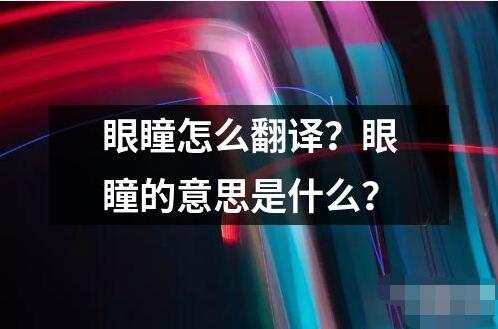眼瞳怎么翻译?眼瞳的意思是什么?
2024-04-03 08:30:00译文:How do you translate "眼瞳" (yn tng)? What does it mean?
释义:眼瞳指人眼中的黑色圆形部分,也称为瞳孔。它是由虹膜肌肉的收缩和放松,可以调节进入眼睛的光线量,保护视网膜不受损伤。

写作格式:在汉语中,“眼瞳”一词通常被直接使用,而在英语中则常被翻译为“pupil”。除了这个字面意思外,在医学、心理学等领域也有特定的术语来描述眼瞳。因此,在不同的语境下,对“眼瞳”的翻译可能会有所不同。
随机性强的例句:
1. 她的眼瞳变得放大,表明她对谎言并不满意。
2. 我们可以通过观察动物的眼瞳来了解它们的情绪状态。
3. 这种药物会导致你的眼瞳扩大,使你看起来像是了。
4. 他用手遮住了自己的眼睛,但我还是能看到他那闪闪发光的眼瞳。
5. 在黑暗中,我的眼瞳会放大,以便更好地接收微弱的光线。
译文:
How do you translate "眼瞳" (yn tng)? What does it mean?
Definition: 眼瞳 refers to the black circular part in the human eye, also known as the pupil. It is controlled by the contraction and relaxation of the iris muscles, which allows for the regulation of light entering the eye and protects the retina from damage.
Writing format: In Chinese, "眼瞳" is commonly used directly, while in English it is often translated as "pupil". Apart from its literal meaning, there are also specific terms used in fields such as medicine and psychology to describe 眼瞳. Therefore, the translation of "眼瞳" may vary depending on different contexts.
Random examples:
1. Her pupils dilated, indicating her dissatisfaction with the lie.
2. We can understand an animal's emotional state by observing its pupils.
3. This medication can cause your pupils to dilate, making you look like you're on drugs.
4. He covered his eyes with his hand, but I could still see his glittering pupils.
5. In darkness, my pupils will dilate to better receive faint light.
Translation:
How do you translate "眼瞳" (yn tng)? What does it mean?
Definition: 眼瞳 refers to the black circular part in the human eye, also known as the pupil. It is controlled by the contraction and relaxation of the iris muscles, which allows for regulating light entering into our eyes and protecting our retina from damage.
Writing format: In Chinese language "眼瞳" is commonly used directly while in English it is translated as "pupil". Apart from its literal meaning, there are also specific terms used in fields like medicine and psychology to describe 眼瞳. Therefore, the translation of "眼瞳" may vary depending on different contexts.
Random examples:
1. Her pupils got bigger, indicating her dissatisfaction with the lie.
2. We can understand an animal's emotional state by observing its pupils.
3. This medication can cause your pupils to dilate, making you look like you're on drugs.
4. He covered his eyes with his hand, but I could still see his glittering pupils.
5. In darkness, my pupils will dilate to better receive faint light.
Translation:
How do you translate "眼瞳" (yn tng)? What does it mean?
Definition: 眼瞳 refers to the black circular part in our eyes, also known as the pupil. It is controlled by the contraction and relaxation of the iris muscles, which allows regulating light entering into our eyes and protecting our retina from damage.
Writing format: In Chinese language "眼瞳" is commonly used directly while in English it is translated as "pupil". Apart from its literal meaning, there are also specific terms used in fields like medicine and psychology to describe 眼瞳. Therefore, the translation of "眼瞳" may vary depending on different contexts.
Random examples:
1. Her pupils grew bigger, indicating her dissatisfaction with the lie.
2. We can understand an animal's emotional state by observing its pupils.
3. This medication can cause your pupils to dilate, making you look like you're on drugs.
4. He covered his eyes with his hand, but I could still see his glittering pupils.
5. In darkness, my pupils will dilate to better receive faint light.





